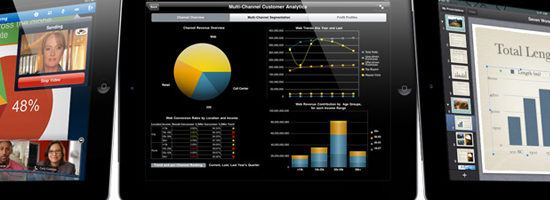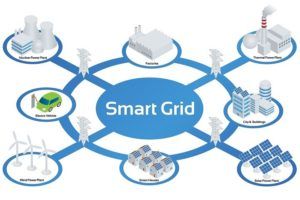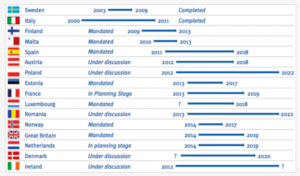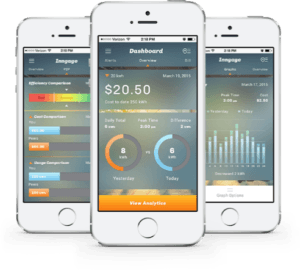Digitalization in the Israeli electricity sector: will the Israeli citizens join the smart metering revolution?

Many governments promote the rollout of smart electricity grids. A smart metering rollout will bring many benefits to the Israeli economy. Although a smart metering project execution started in 2014, it is unclear when a nationwide rollout be carry out.
The digital revolution has arrived at the electricity sector
In the past several years, many governments promoted the rollout of smart electricity grids as a way of handling energy independence, global warming and security of supply [i]. A smart grid is a form of a modern electricity network that enables matching consumption with generation. It delivers electricity from producers to consumers using two-way digital technology. [ii]
Figure 1: Smart metering rollout status in Europe
Smart meters are part of the smart grid, but do not themselves constitute a smart grid. They allow consumers to view real-time electricity consumption data, and control appliances in their houses according to their needs, while saving energy and reducing costs.[iii]
A smart metering rollout will bring many benefits to the Israeli economy
Israel’s electricity market is dominated by The Israel Electric Corporation (IEC), a vertically integrated monopoly. To date, most of the electricity consumers use analog meters with only very limited use of more advanced meters. The government has decided to establish a smart grid across Israel. The IEC is responsible for the implementation of the project. The estimated investment in the project is around $2Bn, of which $550M for smart meters and installation.[iv]
As a public utility, the IEC is responsible for the Israeli electricity sector. The smart metering project should be a high priority for the IEC’s management, and it is expected to bring many benefits to the electricity sector, including:
- Direct financial benefits – The smart metering project includes the installation of smart meters that are capable of managing the metering remotely and preparing electricity bills automatically, hence allows reduced operational costs[v]
- Energy efficiency benefits – efficient planning of power consumption to reduce total energy use and peak demand, and deliver consequent environmental and conservation benefits[vi]
- Power reliability and quality – ability to disconnect and reconnect the feed line and transmit a warning of loss of supply voltage
The Israeli Electricity Authority estimated the direct benefits from installing smart meters at $500M in the first 10 years period.[vii]
Although the smart metering project’s execution started in 2014, it is unclear when a nationwide rollout be carry out
The IEC’s management decided to carry out the smart metering project in three stages: [viii]
- Technological pilot – in 2014, 4,600 meters were installed in Binyamina city in order to examine 3 different technologies. The pilot ended, and 2 technologies were chosen.
- Economic pilot – expansion to 30,000 meters for a practical cost-benefit analysis of transitioning to nationwide smart metering in various geographical areas. This stage was supposed to happen during 2015, and after many delays, in February 2017, the company entered a comprehensive purchase agreement with the Ericsson Israel Company. [ix]
- Nationwide rollout of 2.7 million meters – this stage will be carried out in a few years, depending on the results of the economic pilot and other considerations, such as ministry decisions and IEC’s financial stability.
The IEC should address public concerns and plan according to near-future trends
The technological pilot in Binyamina led to public protests with diverse claims: radiation transmitted from the meters, privacy violations as a result of the collection of detailed information on electricity consumption, and a religious problem with the use of meters on the Sabbath.[x] Before starting the next phase, the IEC should address these public concerns – check complaints about radiations, define a privacy policy, seek for a religious solution (in Israel you can easily find “religion suited” elevators, refrigerators, etc.), and also launch a campaign that explains the benefits of the project.
Furthermore, while the IEC tries to promote this project, future trends are being developed: Electric Vehicles, Smart Homes and Cities. Looking forward, the IEC’s management must plan how to integrate their current project with these future trends, so it won’t leave Israel lagging behind the progress.
Figure 3: Smart grid and future trends
Finally, as a public utility, the IEC struggles to execute this project due to various factors, including public concerns mentioned above, conflicts with regulators, financial instability, and bureaucracy of a big traditional organization. A question that must be asked is, “Is a public utility capable of successfully leading a digital transformation at all?”
(Word count: 739)
[i] Prof. Gershon Grossman and Tal Goldrath, “Smart Grid – Summary and recommendations by the Energy Forum at the Samuel Neaman Institute,” the Technion, 2010, https://www.neaman.org.il/Files/energy%20forum%2016%20abstract_20170420105815.191.pdf, accessed November 2017.
[ii] Yasha Hain, “Israeli smart grid vision and plans,” online power point presentation, May 22, 2013, https://www.slideshare.net/IsraelExport/iec-israeli-smart-grid-vision-plans, accessed November 2017.
[iii] Lior Guttman, “The Energy ministry missed the power generation forecast and the public will lose $2Bn”, Calcalist, October 25, 2017, https://www.calcalist.co.il/local/articles/0,7340,L-3723552,00.html, accessed November 2017.
[iv] Report of the recommendations of the Committee for the reform of the Israel Electric Corporation and the electricity market, March 2014, http://energy.gov.il/AboutTheOffice/SpeakerMessages/Documents/%D7%93%D7%95%D7%97+%D7%99%D7%95%D7%92%D7%91+20032014+-+%D7%A0%D7%A7%D7%99.pdf, accessed November 2017.
[v] Gerald Myers, “Improving Israeli’s Electricity sector”, The Movement for Quality Government in Israel, November 18, 2015, https://mqgisrael.org/2015/11/18/improving-israels-electricity-sector/, accessed November 2017.
[vi] Prof. Gershon Grossman and Tal Goldrath, “Smart Grid – Summary and recommendations by the Energy Forum at the Samuel Neaman Institute”.
[vii] Guttman, “The Energy ministry missed the power generation forecast and the public will lose $2Bn”.
[viii] IEC, 2016 annual report, p. 77, https://www.iec.co.il/EN/Documents/The_Israel_Electric_Co-Financial_Reports_December_2016b.pdf, accessed November 2017.
[ix] Tashtiot Editors, “Ericsson Israel won a procurement tender for supplying smart meters in the electricity network”, Tashtiot Energy Portal, February 12, 2017, http://www.tashtiot.co.il/2017/02/12/%D7%9E%D7%95%D7%A0%D7%99-%D7%97%D7%A9%D7%9E%D7%9C-%D7%93%D7%99%D7%92%D7%99%D7%98%D7%9C%D7%99%D7%99%D7%9D/ , accessed November 2017.
[x] Nati Yefet, “Ericsson Israel will supply smart meters to the IEC”, Globes, February 12, 2017, http://www.globes.co.il/news/article.aspx?did=1001176544, accessed November 2017.
Figures:
(1) Source: European Commission, “Cost-Benefit analyses & state of play of smart metering deployment in the EU-27”, published by the European Commission, 2014.
(2) Source: Innowatts, “Our new applications driven by smart meters,” https://www.innowatts.com/innowatts_tech_app.php , accessed November 2017
(3) Source: Rohit Bhisey, “Growing Implementation of Smart Meter Technologies to Improve Smart Grid Capability”, The Edition Truth, June 6, 2017, http://www.editiontruth.com/global-smart-grid-market/, accessed November 2017





Thanks for great post!
I think it is important to have in mind that roll outs of such technologies are likely to be delayed. For example, in the UK the roll out of Smart metering system is suffering from delays, and thus more costs than expected. [1] Additionally, because of the delays it is very important to continuously communicate the Smart metering benefits to the customers to keep them engaged.
[1] http://www.telegraph.co.uk/business/2017/03/17/clock-ticking-energy-markets-smart-meter-revolution/
Anat has done a great job of not only outlining the efforts led by the Israeli Electric Corporation (IEC) to digitize its grid, but also of highlighting the several challenges and public concerns faced during the implementation of the IEC’s smart metering project. Indeed, safety, privacy and religion are important factors to be taken into consideration by a public organization when driving such a significant digital transformation. Building on Anat’s suggestions, I would indeed recommend the IEC to monitor the side effects of the meters – such as radiation – and invest in product development to solve them. The IEC should definitively work closely with regulatory agencies to define a solid privacy policy. Besides this, I think that the IEC should go beyond a simple awareness campaign and educate the population through workshops and trainings. Indeed, citizens should be able to not only understand the benefits of the smart metering project, but also be truly engaged and committed to this project. For example, the IEC could teach families how the meter work and provide them the opportunity to install it themselves at home. On another hand, it would be important, as Anat mentioned, to integrate the smart metering project into other digital projects such as Electric Vehicles and Smart Cities. The IEC should not only highlight these digitalization initiatives as key for Israel to catch up on future trends, but also as enablers of economic growth by boosting the development of new sectors related to smart technologies. The IEC could for example train and hire young Israelis to develop projects related to the digitalization of its infrastructure, or organize competitions to enable citizens to present their own projects related to this matter.
Replying to Anat’s last question, I would definitively say: Yes, I strongly believe that by aligning all stakeholders’ incentives, a public utility is capable of leading a digital transformation.
I agree with the analysis around executing against public concerns raised in Israel and think that the last question is the key to this issue. I do think that a public utility is capable of successfully leading a digital transformation precisely because it is public, and I would take it a step further to say that in order for this transformation to take place in the social context described it is important to have commitment from the bottom up, rather than the top down. As such, if the project is done in coordination with the government, it has the stamp of approval of the state, which has the power to align with the people and to influence the social perception of the digital transformation. The key to social change in these situations is the coordination between the public and private sectors. Finally, this project will inevitably be more difficult than the next large scale digital initiative in Israel. As technology progresses at an exponential pace, a project like this could provide a way to begin the conversation around the role digital will play in the lives of Israel’s people in 5 years, in 10 years, in 50 years, and beyond. This problem is not specific to Israel, of course, and provides a lens through which we can engage with how technology impacts our lives, our religious practices, our family dynamics and requires everyone to assess their own lives and their views of what is important and how technology interacts with those things.